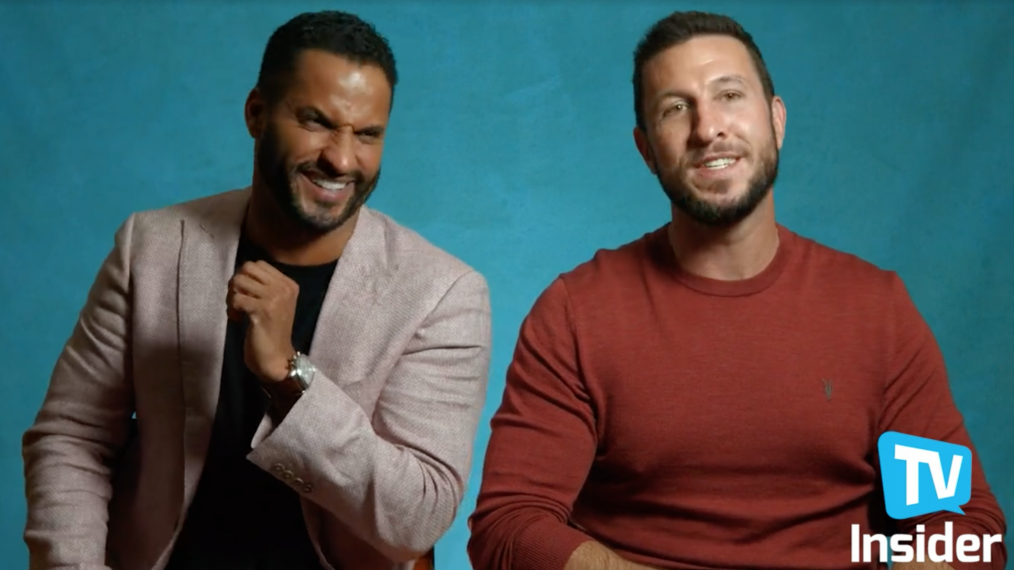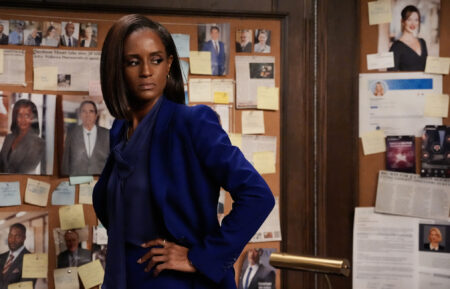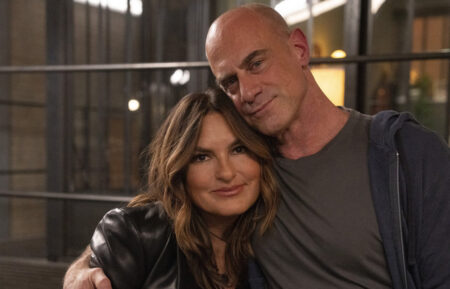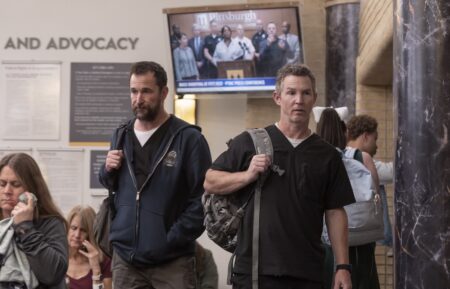‘American Gods’: Pablo Schreiber on Mad Sweeney’s Big Episode & Going to Battle (VIDEO)
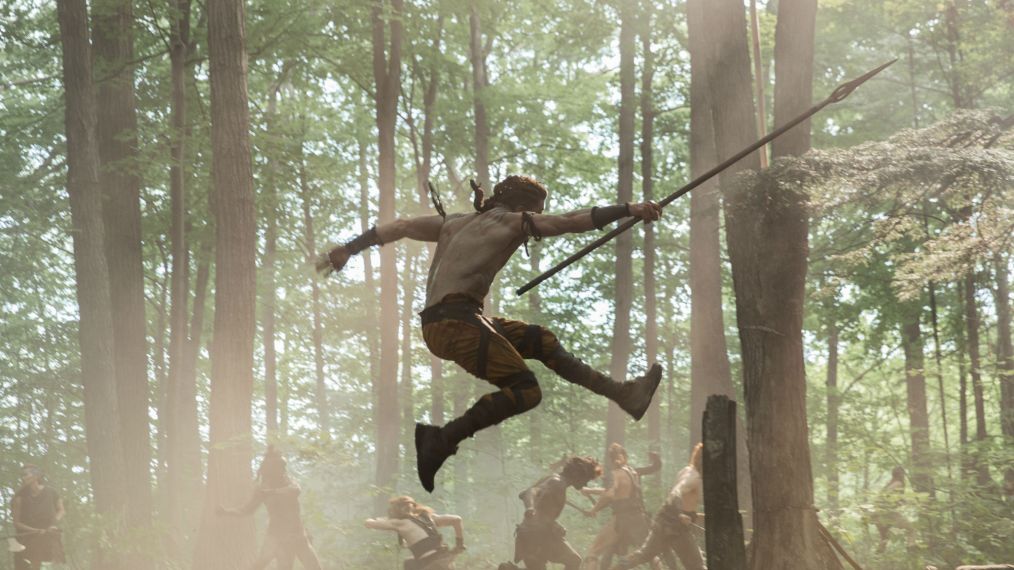
Q&A
After last week’s episode of Starz’s American Gods provided us with some juicy family backstory for the mysterious Mr. Wednesday (Ian McShane) and his son, Thor (Derek Thaler), this Sunday’s episode turns its attention to the colorful, F-bomb loving, fiery leprechaun, Mad Sweeney (Pablo Schreiber).
While Sweeney has been paying off a debt for Wednesday, he’s clearly had enough of being under Odin’s thumb and may finally be ready to take big steps to finally free himself. Also, in the course of the episode — outside of some repercussion from that recent hookup with dead wife Laura Moon (Emily Browning) — we’ll also see more of Sweeney’s backstory that helped shape who he is today.
TV Insider talked once again with Schreiber (we recently chatted with him and Gods‘ co-star Ricky Whittle at the start of the season for the TV Insider podcast) about this big episode for Sweeney. Plus, he opened up about shooting one of the battle scenes we see in the episode, along with Sweeney getting some simpler, one-on-one moments with characters he doesn’t normally share screen time with.
When you first read this script, what were your first impressions?
Pablo Schreiber: I worked pretty closely with Heather Bellson, who wrote it and it took shape by way of [executive producer] Neil Gaiman as this episode was being put together. It was also at the time when there was a bit of a power vacuum [behind the scenes], which really played to our favor in the sense that we were given a lot of latitude and leeway to create what we wanted.
Paco Cabezas came on as the director and he added a really unique flavor and vision to it. He’s a fantastic horror director and that element of horror-thriller laid on top of this reverse descent into madness, which was Sweeney coming to clarity, coming out of the fog and realizing who he is and who he’s always been. It all just kind of came together in a really beautiful and organic way.
We get to see what the mad in Mad Sweeney in this episode — very much so!
Yup and it connected a lot of the dots and the history of where he’s been and why he operates with as much shame as he does in terms of wanting to correct some of the guilt. Especially the one day where he ran from battle and what it means now for him to end things in an honorable way.
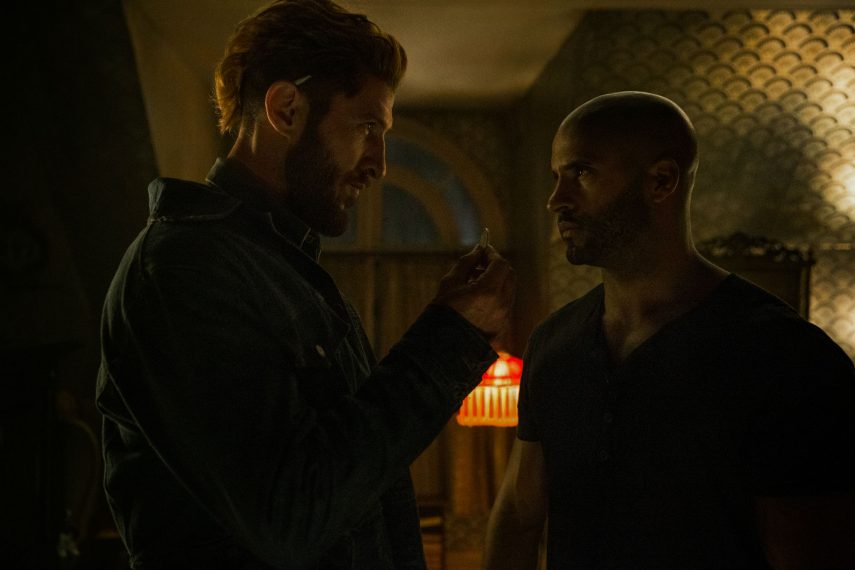
Pablo Schreiber and Ricky Whittle in ‘American Gods.’
In the early part of the episode, Sweeney says, ‘Sometimes you remember things one way, sometimes you remember them another.’ What does that mean to you and to Sweeney?
I think it’s about identity. He’s trying to uncover the secrets of his identity and he doesn’t know how much of it is memories that he has and how much of it is oral history that’s been passed down. How much of it is story, how much of it is true? Where is the line between fiction and reality? And identity. And where those three things meet can be really muddy.
There are a lot of scenes in this episode where Sweeney gets some one-on-one time with characters like Bilquis (Yetide Badaki), with whom he doesn’t normally interact. How was that for you?
One of my favorite elements of the episode is that Sweeney gets to have time with the other characters and with Shadow (Ricky Whittle), which feels incredibly important and potent. And the two add-ons that you get for free that you didn’t think you were going to get is the scene with Bilquis and the scene with Salim (Obid Abtahi). They both play as these really tender and lovely moments.
With Bilquis and Sweeney, there is mutual respect and suffering of two ancient beings who are doing what they can to survive under difficult conditions. But with all the mutual respect, they’ve known and been around each other for centuries now and Bilquis adds a layer to the identity situation, as well.
And the conversation with Salim (see a clip below) is really beautiful. It’s simply about love.
It feels so good when the show just comes down and has two people talking about something simple, and in that case, it’s just two guys sitting on a step talking about love. I really like the connection between the two of them and it’s a theme of the whole episode. Sweeney comes back to Cairo to make a new chapter, and part of that is he’s acknowledging that he’s been a destructive force, or he’s aided as a destructive force, and he’s no longer willing to aid the destructive force. So when you see him having these tender moments with people that you’re not expecting him to be tender with, it all goes towards his need to right all wrongs, which I think to be a positive force to people rather than a destructive one.
And, since it’s all Sweeney has been talking about, it’s great that we get to see some of his past in battle. How long did it take you to shoot?
It was a massive undertaking, but we actually shot it in two days. I was surprised that we were able to get all of the stuff that we were in those two days. I think they went back and had a second unit day with stunts just doing like inserts and what not. I was on set for two days for that sequence and, to me, the quality of that sequence is like feature film-level quality. A feature film would spend a good week or more on a sequence like that. But you get to see Sweeney in his glory, as a king and you see that taken away.
The Sweeney/Shadow relationship has really changed since the first episode of the series. How has that been to play?
You think back to Season 1 Episode 1 and Sweeney’s first words to Shadow are a warning [about Wednesday] and so it’s come full circle in a really beautiful way. From Sweeney’s perspective, the elements of it were already there from the beginning, but, again, it’s all about him trying to be a positive constructive force rather than a destructive one.
American Gods, Sundays, 8/7c, Starz

